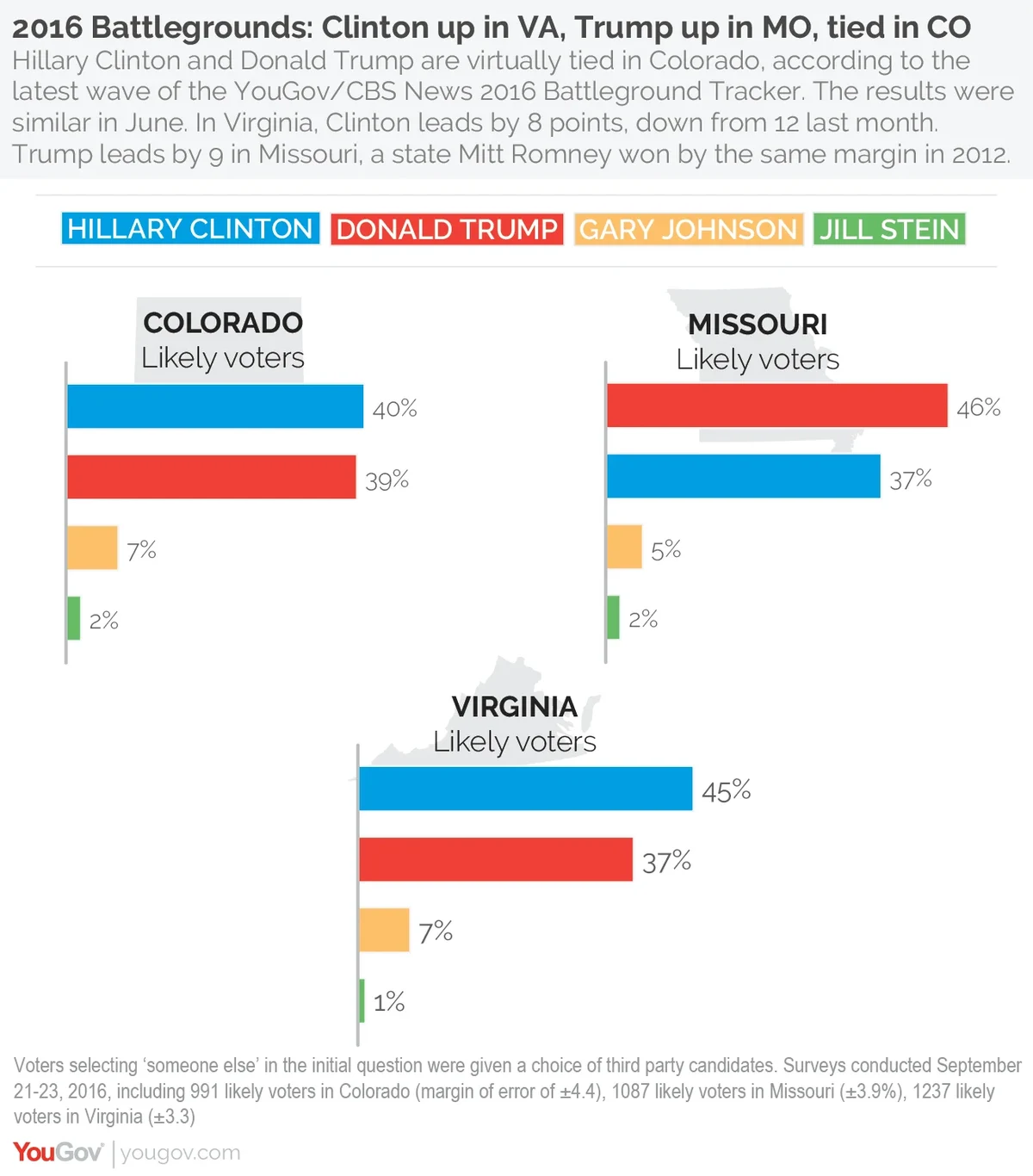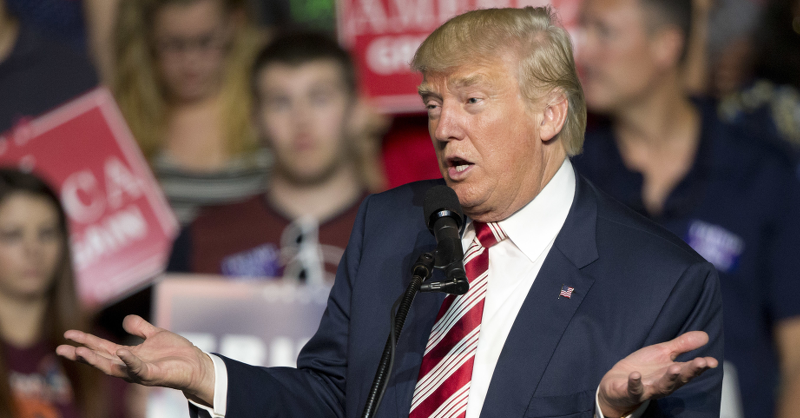The latest wave of the YouGov/CBS News 2016 Battleground Tracker polled likely voters in three states
Ahead of the first presidential debate Democrat Hillary Clinton gets mixed results in two key battleground states, while Republican Trump holds a comfortable lead in one-time swing state that has been trending red in recent elections.
Although down from her commanding 12-point lead last month, Clinton still leads by a comfortable eight points in Virginia, with 45% to Trump’s 37% among likely voters. The previous poll was taken in early August, in the midst of Clinton’s post-convention polling bounce.
Colorado is a much closer race. Clinton garners only 40%, giving her only a nominal one point lead over Trump, at 39%. This is exactly in line with where the race was when the Battleground Tracker last polled Colorado in June, before the conventions.
And in Missouri – where Obama nearly eked out a win in 2008, but lost by nine points to Mitt Romney in 2012 – Donald Trump also leads by nine points, with 46% to Clinton’s 37%. Once a true bellwether state, Missouri has trended Republican over the past two decades.

Colorado and Virginia
Obama won Colorado and Virginia by similar margins in 2012 – Colorado by five and Virginia by four. Due to rapidly shifting racial demographics, large college-educated populations, and late-summer polls that gave Clinton double-digit leads in both states, Colorado and Virginia are often placed in the same category of competitive states that might not be so competitive in 2016. But this poll reveals some important differences between the two.
For example, Clinton loses white voters by similar margins in each, trailing Trump by seven points in Colorado and 11 in Virginia. However, while the largely African-American non-white population of Virginia backs Clinton by an overwhelming 71-16, the largely Hispanic non-white population of Colorado supports Clinton by only 53-24. Thirteen percent of non-whites in Colorado pick a third party candidate, while 11% are undecided or don't plan to vote.
Indeed voters in Colorado, particularly young voters, are particularly likely to be undecided or opt for third party candidates. Among 18-29 year olds Clinton wins only 39% support, while Libertarian Gary Johnson, at 18%, has almost as much support as Donald Trump, at 21%. Another 6% support the Green Party Candidate, Jill Stein. 39% of young voters in Colorado say they would “never consider” voting for Clinton – though 60% say the same for Donald Trump. Gary Johnson's support is actually the same (18%) among Virginia under-30s, but Clinton gets 48% and Trump 24%.
Another big difference is how many partisan voters support their party's nominees. In Colorado, Clinton has virtually no advantage in this respect: 86% of self-identified Democrats back her and 84% of Republicans back Trump. In Virginia, however, Trump wins only 73% of Republicans, while 93% of Democrats back Clinton.
And Colorado voters are more likely to see Trump as prepared to deal with major issues. Roughly 48% of Colorado voters say Donald Trump “can fix the economy” and 46% say he “has the right approach to terrorism”. Only 35% say the same for Clinton on the economy and 39% on terrorism. In Virginia, Clinton is three points over Trump on terrorism (46% to 43%) and only two points behind on the economy (41% to 43%).
Winning Colorado (9 electoral votes) and Virginia (13) would also significantly shore up Clinton's path to 270: add Colorado and Virginia to the states John Kerry won in 2004 and Clinton is already at 273 electoral votes – that is, without Iowa, Nevada, North Carolina, Ohio or Florida.
Missouri
Missouri appears to have fewer surprises in store. Some polls had suggested the race might be surprisingly close – a potential harbinger to something like Obama’s unexpectedly strong performance in 2008, when he lost Missouri by only 0.1%.
But the Battleground Tracker finds Trump leading by nine, driven by strong support among white voters, who back Trump over Clinton by 54% to 27%. In an unusual case for 2016, Trump also performs slightly better among self-identified Republicans, 84% of whom back their party’s nominee, than Clinton does among Democrats, 79% of whom back her.
Interviews were conducted September 21-23, 2016 for the CBS News 2016 Battleground Tracker. A detailed description of the methodology used to carry out the surveys can be found here.
See additional questions and demographic breakdowns for Colorado, Missouri and Virginia.










